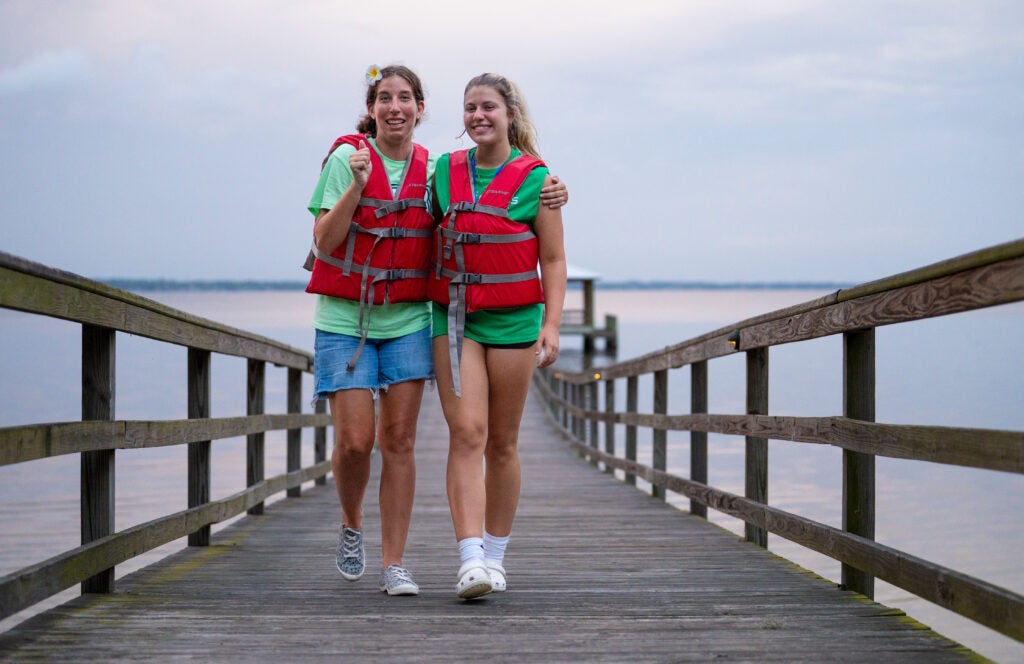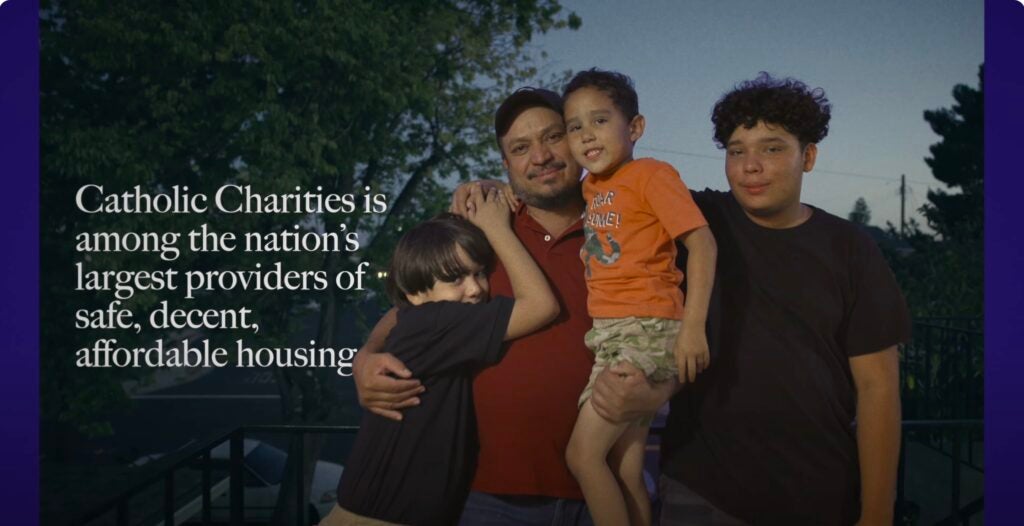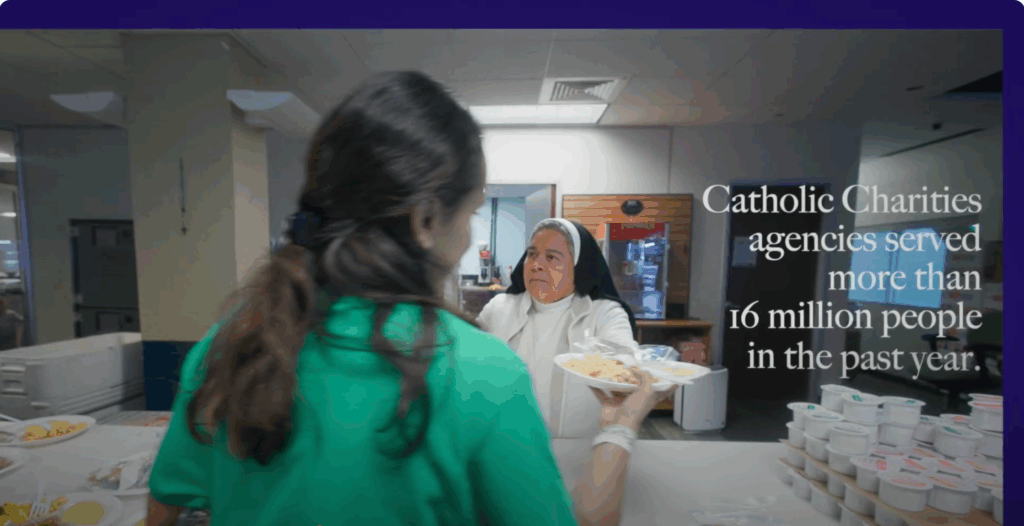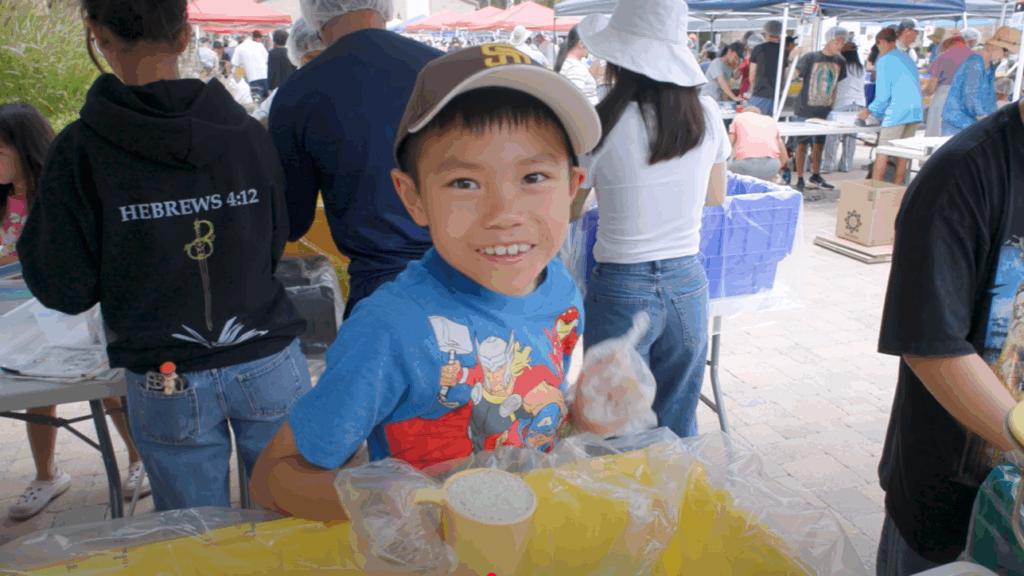
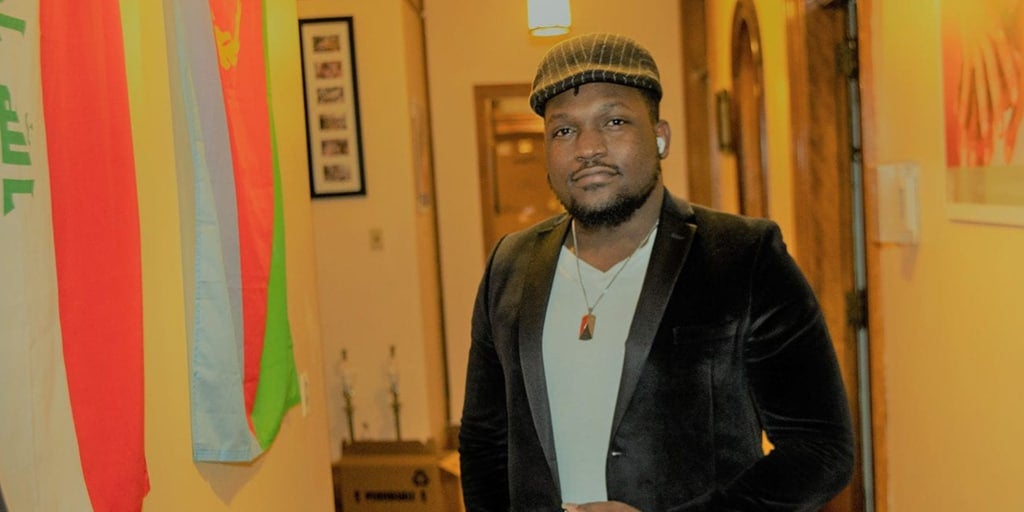
Charles Mugabe is the COVID-19 Project Coordinator for Catholic Charities Refugee and Immigration Services in Maine. As the liaison between Ethnic Community-Based Organizations statewide, Maine’s Department of Health and Human Services, and the Maine Center for Disease Control and Prevention, Mugabe works with a coalition of organizations to help provide COVID-19 social service support for all members of Maine’s immigrant communities who are isolated and undergoing quarantine because of the virus.
Only 23 years old, his life experiences have more than prepared him to lead this effort. At a young age, he fled with members of his family from war in the Democratic Republic of Congo, living first in a refugee camp and then in Uganda until 2016, when he immigrated to the U.S. at age 19.
“Great numbers of people were killed in the wars, but my grandmother, aunt, and I escaped. Our lives in Uganda were totally different. We had to learn new languages and my aunt, who is wonderful, fought to get me into a school while we were there, so I could learn English and get an education. Like many other refugees, we hoped to be able to immigrate to the U.S.,” said Mugabe.
The preliminary process for gaining approval to immigrate was a grueling one, he said. “We were tested and evaluated repeatedly and, finally, after six years, we were told that we would be admitted to the U.S.
“I remember flying with other refugees from Uganda to Brussels and then on to John F. Kennedy International Airport in New York. It took hours and hours, but we were all very excited, seeing America for the first time. We found it difficult to understand the British-English used by the service agencies’ representatives, and we were all grateful there were interpreters there who could help us,” said Mugabe. “Everyone was nervous and afraid; we didn’t want to do anything to get sent back.”
Mugabe’s first stop in the U.S. was not Maine, but Maryland. He recalls his ride from the airport. “We were exhausted and were expecting to see tall buildings and skyscrapers. But instead, we saw glimpses of forests and the rural countryside. It was cold and windy, and – as we had no idea where we were – our imaginations started kicking in. The social service people tried to make us comfortable by buying food they thought that we would like, but it was the first time we had eaten American food and we thought it was quite spicy and salty. And we didn’t like the taste of the water.”
In Maryland, the family’s first priority was to connect with their case-manager from the resettlement organization. “She took us shopping, helped us get phones, and find food we liked and could cook. She referred us to doctors, made sure we had the documents and benefits we needed, and helped us prepare to find jobs,” he said.
But in Maryland, they felt lonely, and after eight weeks they discovered that a close friend, also a refugee, had settled in Maine. “She called us and asked why we were in Maryland and said that we needed to come to Maine, where she could help us start our lives and we wouldn’t be alone. She assured us that we would make connections here,” he said.
“Someone drove us from Maryland to Maine. It was October and quite cold. Little did we know that the cold would get worse and worse. In Portland, we connected with our caseworkers at Catholic Charities, where they did further background checks and helped us find an apartment in Portland. And we got warmer jackets and started to get used to the cold. Each of us was assigned a case-manager to help navigate the new living situation. My grandmother’s case-manager worked specifically with elders, and that was a great help,” he said. “Portland was very different than Maryland. We were not isolated like we were in Hyattsville. People were friendly to us; they smiled a lot and even approached us to talk. It felt like home automatically. Other immigrants we met wanted to help and they welcomed us.”
Mugabe’s case-manager at Catholic Charities asked if he would like to work with her as a volunteer, assisting with the paperwork required for immigration and functioning as an interpreter. After a short time in that position, he was promoted to a job as a receptionist at the agency, then promoted a second time to a paid job as a case aide. At the end of the year, Mugabe was promoted again, this time to the position of case manager.
“When I got promoted to case manager, helping asylum seekers was my first assignment,” he said. “Many asylum seekers have had months and months of detention at the U.S. borders; they need help obtaining approval for their status and with getting settled into their communities. My job at Catholic Charities is to help them with these issues.”
Last year, when the COVID-19 virus hit, Catholic Charities promoted Mugabe to the position of COVID-19 Project Coordinator. The federal money granted funds to Maine to help identify and care for people who have the virus. Catholic Charities received the funds through the state’s Department of Health and Human Services (DHHS) Program, and sub-contracted with 27 established, local Ethnic Community Based Organizations (ECBO) in Androscoggin, Cumberland, Hancock, Washington, and York counties. These organizations, which include mainstream agencies and immigrant-led grassroots organizations, are working to ensure that immigrants and asylum seekers receive the help they need when fighting the virus.
At Catholic Charities, Mugabe coordinates a wide range of support services with the partner organizations, including providing assistance to schools, conducting virus prevention educational programs, and leading outreach initiatives to new immigrant communities statewide. His work with the partner organizations also includes supporting investigators and contact tracers from the Maine CDC, responding to community members who have basic health and survival needs, and supporting the multicultural staff and people of color who are working in jails that have virus outbreaks.
When needed, the partner organizations also provide immigrants with direct support services such as food, medicine, and housing. For individuals who are virus carriers and must be quarantined, Mugabe and the agencies identify places where people can live in quarantine. In some cases, complete families or individuals who need to be isolated have been housed in hotels operated by the state or in other protected facilities. If a person is in quarantine, agencies also help with bill paying, laundry, and grocery shopping.
Mugabe’s background is a good match for the job he now holds. In addition to his personal experiences immigrating to the U.S., he has also completed two years of a nursing program in Portland, as well as trauma training. Today, Mugabe, who speaks English, French, Kigegere, Lingala, Luganda, and Swahili, uses his personal history to understand and help refugees and asylum seekers in Maine.
“With the administration of Catholic Charities, I want to express my gratitude to our community partners who are working hard to make a difference,” said Mugabe. “We also want to thank DHHS, and the Commissioner’s and Governor’s offices for funding this community effort, and for developing this new system of social support for COVID-19. More than 500 families in Maine have been impacted by the virus, and we hope to continue our work until everyone in the communities is safe.”
People of color in Maine are experiencing higher case rates of COVID-19 than white citizens. Many live in crowded or dilapidated housing, lack access to ongoing preventive medical care, and suffer from chronic diseases. They often work in front-line jobs such as hospitals, nursing homes, group homes, and processing plants. In the case of refugees and asylum seekers, many are trauma survivors, which increases susceptibility to illnesses.
Maine is one of only a few states that has a COVID-19 Social Support Community Care program in place, Mugabe said. “When a case is identified anywhere in Maine, it is referred to the [Maine] CDC and automatically investigated. Investigators recommend how we should quarantine the individual and work with us to determine the patient’s ‘point of care,’ and track the spread of the virus.”
Helping immigrants get culturally appropriate food is a big issue, Mugabe said. He remembers the difficulties his family encountered in getting food in Maryland that could make them feel safe and comfortable – food that was appropriate for their culture and country of origin. He tries to ensure that the food provided to immigrants meets the standard that he and his family appreciate. Mugabe also says the partner agencies have found that, in stressful situations, matching immigrants and asylum seekers with people from their same countries is very important to ensure that the new arrivals are understood and have people with whom they can easily relate.
“Because our program is connected to the state, I receive notifications directly when there is a virus outbreak. We’ve been able to identify the multicultural communities around Maine where culturally familiar and appropriate language assistance is needed,” Mugabe said. “We’ve had COVID-19 outbreaks in a few schools in Maine, and a large number of people connected to our schools are in quarantine. Right now, many schools need multi-ethic, language, and cultural support.” He said that parents who don’t speak English often depend on their kids to be interpreters. “But parents still prefer hearing information from someone in authority, so when we have something important to communicate, we provide language assistance.”
In northern Maine, COVID-19 educational and testing programs have been developed to help migrant farm workers, Mugabe said. “Our priority there is to make sure people can learn about the illness in the languages of the countries from which they come, such as Haitian and Spanish. Migrants start to arrive in the early summer to help with crops. This past spring and summer, we set up a program to test people when they arrived and worked with our partner organizations to coordinate services for them and make sure their needs were met. We will need to continue this in 2021.”
Federal funding for Maine’s COVID-19 program is due to expire at the end of December 2020, Mugabe said. If the funding is not renewed, Maine will not be able to stay on top of the virus.
“Many organizations are offering services that will end if the funding is not extended. And if we can’t operate the program, we will have a total disaster. Just as COVID-19 is growing and getting worse, the funding is set to expire. Right now, the rate of contagion is at the highest I’ve seen it, maybe two or three times more than what it has been up to now.”
“I want to express my gratitude to all the partner organizations that have been working together so effectively through this crisis,” he said. “The model we are using, with different organizations cooperating to help people throughout the state, is a good one. The state of Maine is looking for funding alternatives, but this is a federal issue, not a state issue. If the funding ends next month, we will be facing a very frightening problem.” The immediate challenge is to find the funding necessary to sustain the program.
“I’m working remotely at home and my grandmother and aunt are doing OK, but this is very scary for them,” said Mugabe. “I have been trained, and I’m familiar with where the threats exist, so I know how to be careful. But my grandmother and aunt, they don’t know much about the virus, and they are continually getting mixed messages about what they should be doing to protect themselves. I talk with them and try to share the things I know. I’m trying to teach them how to protect themselves.”
Mugabe works closely with many others who are trying to contain the virus. “We don’t want Maine to become a hot zone, so right now people should be doing everything they can to protect themselves, their families, friends, and neighbors,” he said.
This article by Karen Cadbury is made available here through the kind permission of Kathreen Harrison, editor in chief of Amjambo Africa, Maine’s free newspaper for and about New Mainers from Africa.
